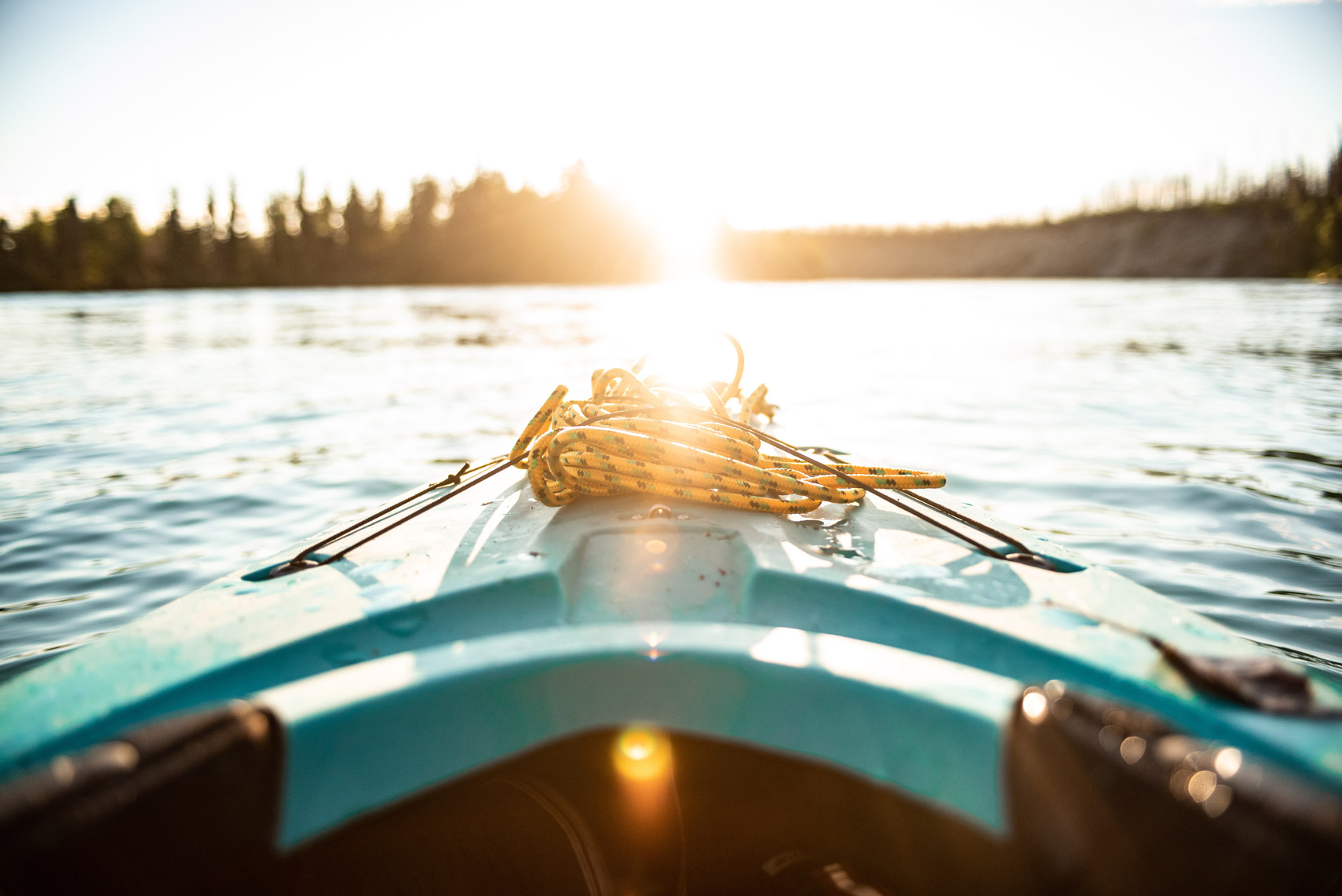Kayaking is not exactly a new sport, but it’s definitely more popular than ever. As life brings us more toward the city, or the city spreads more toward us, it’s great to have a chance to enjoy fresh streams and refreshing lake waters – without the expense of a speedboat or a marina club membership.
Portable, safe, and beginner friendly, kayaks unfortunately have a reputation for not being budget-friendly. With a little bit of in-depth research, though, you can find the many high-quality kayak options that are out there for under $200, including both solid and inflatable kayaks.
Best Budget Kayaks for Beginners and Advanced Kayakers
These kayaks are great for newcomers to kayaking who are hesitant about investing too much on the get go, or those who need a less-flashy secondary kayak for short trips.
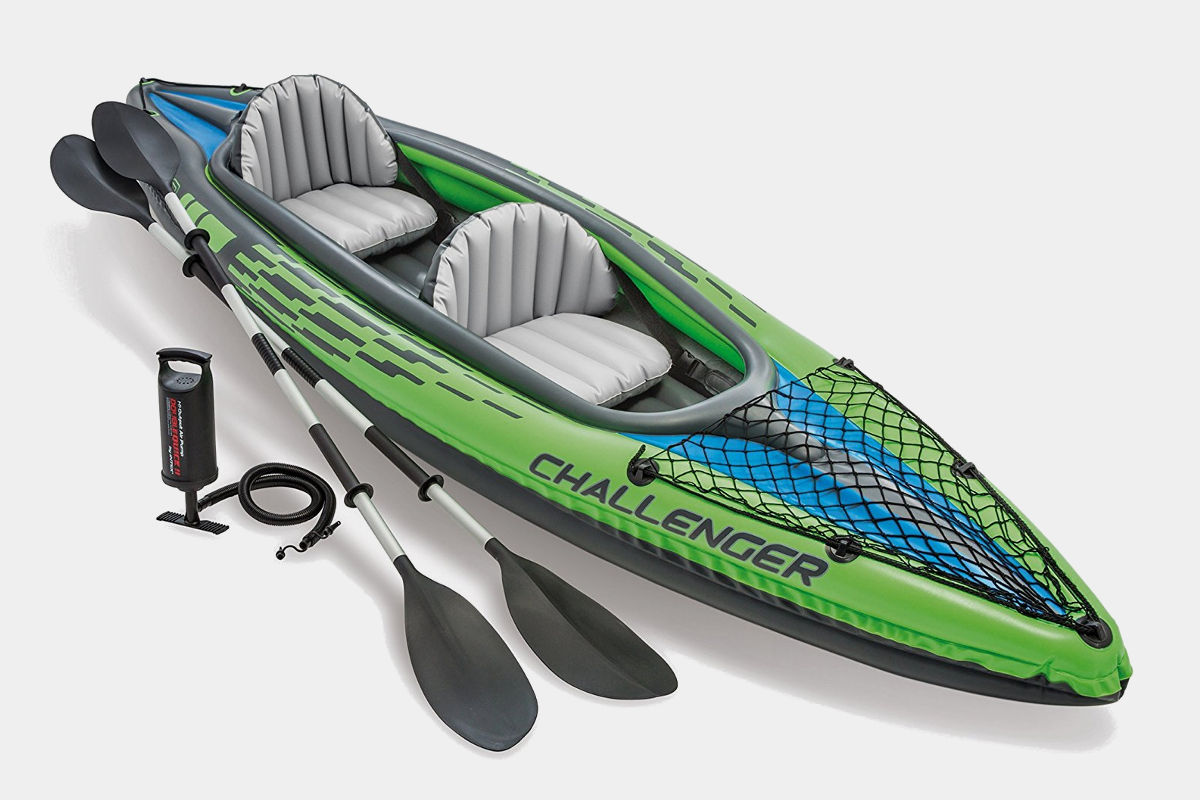 Intex Challenger K2 Kayak
Intex Challenger K2 Kayak
This sit-on-top inflatable kayak is made from damage-resistant vinyl. Puncture resistant and stable, it comes with light aluminum paddles, a pump, and its own patching kit.
The Challenger sits two people and measures 11.5 feet by 30 inches. It can carry up to 400 pounds.
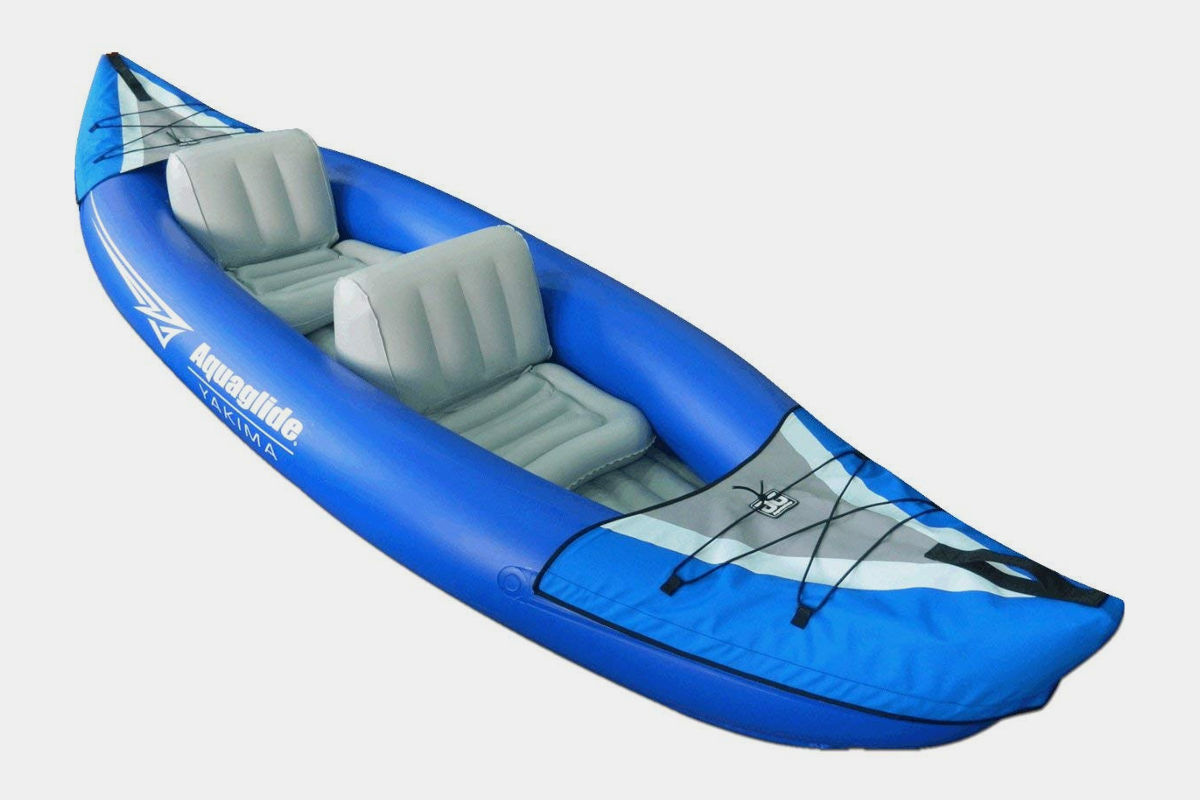 Aquaglide Yakima
Aquaglide Yakima
It’s a sit-on-top inflatable kayak made from 24-gauge PVC with Integrated polyester deck skirts The end result? No stops in the middle of the road forcing you to check the air pressure or to reflate.
The Aquaglide comes with two original Yakima seats, which are padded and very ergonomic. A couple of transport handles round out this very affordable package.
The Yakima is 11 feet long and 31 inches wide with a carrying capacity of up to 400 pounds. When not inflated or assembled, it fits easily in any closet.
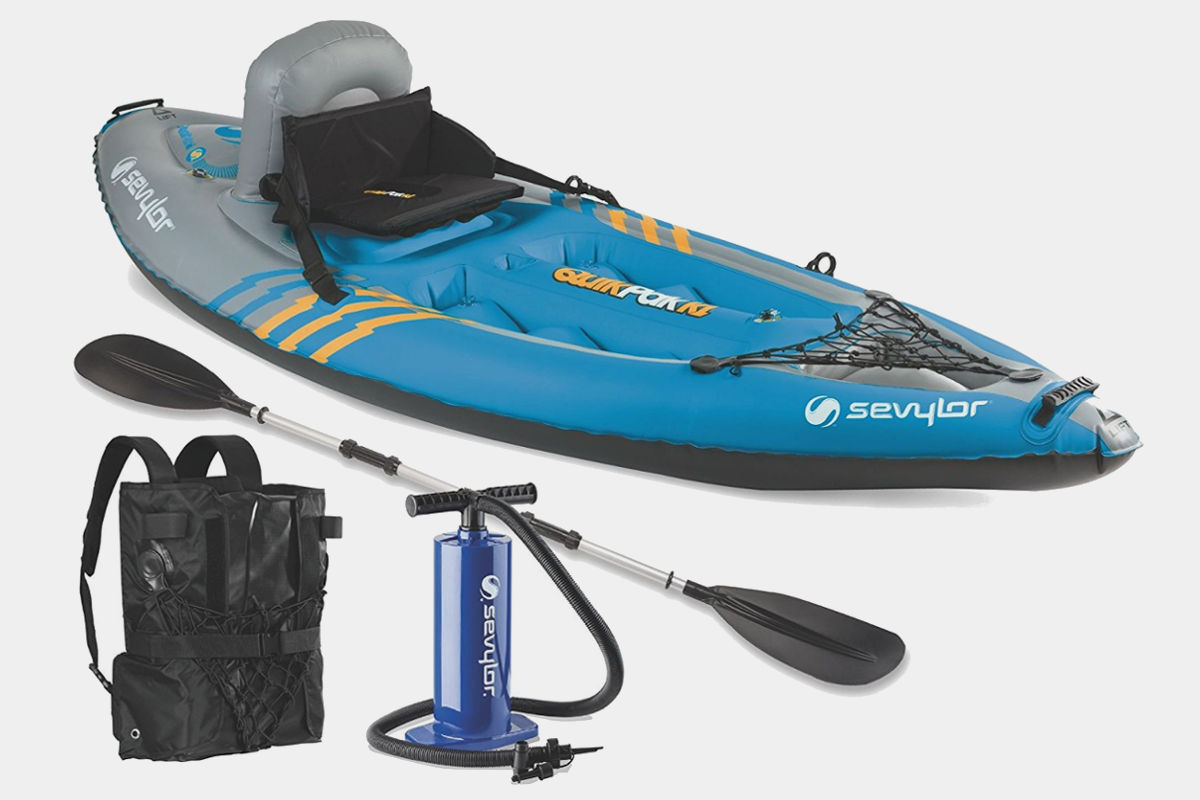 Sevylor K1 Quikpak Inflatable Kayak
Sevylor K1 Quikpak Inflatable Kayak
This sit-on-top inflatable model is made from rugged 21-gauge PVC. The kayak’s bottom is reinforced with tarpaulin to add some extra resistance to punctures, which makes this a very reliable partner for your next lake trip.
The storage area is equipped with bungees to secure your belongings. And while adjustable seats may be too complicated to include in an inflatable kayak, Sevylor did manage to equip the K1 with adjustable foot rests, which go a long way in making the trip more comfortable.
This kayak is meant to fit just one person, but it can accommodate a fairly large one. Nine feet long and nearly three fit wide, it can carry up to 400 pounds.
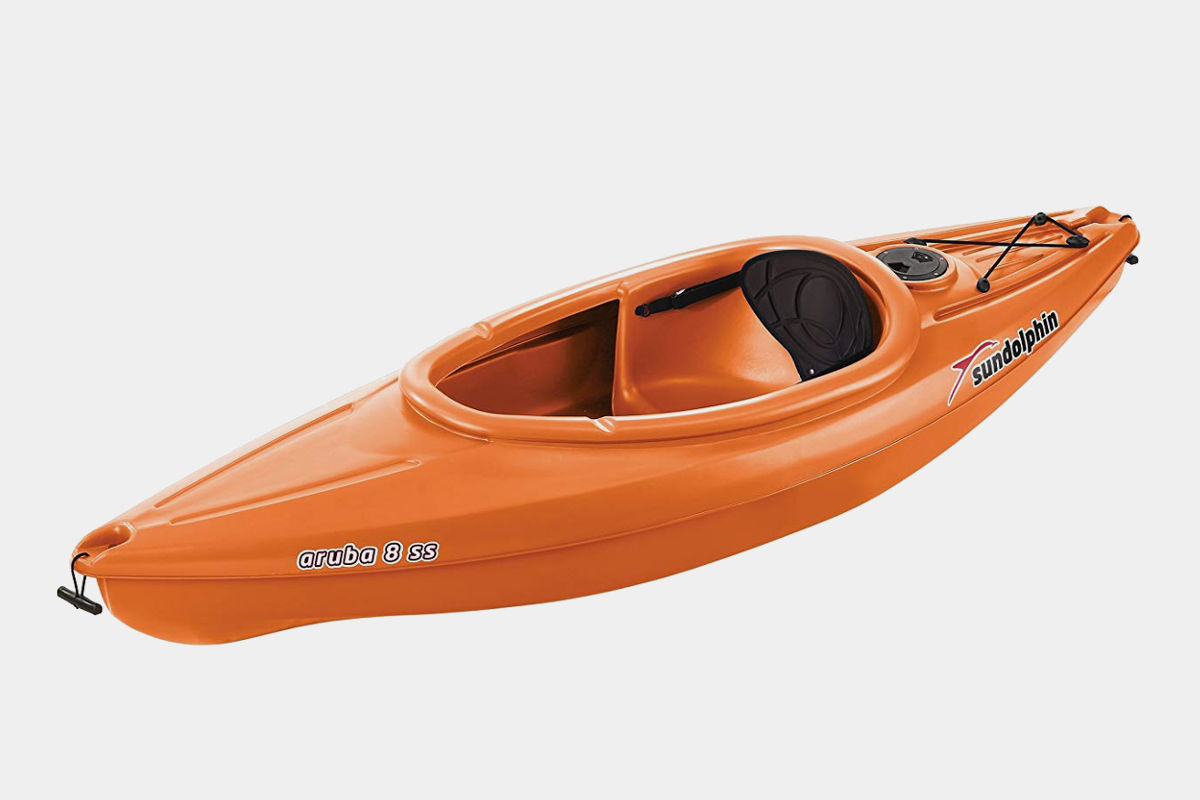 Sun Dolphin Aruba SS, 8-feet version
Sun Dolphin Aruba SS, 8-feet version
Sun Dolphin is one of the most respected kayak brands out there, after all, and the Aruba is one of their top budget-friendly recreational models. Their 8-foot version is more affordable than the 12 or 10-foot ones, and will also save you money in freight and transport. However, it still includes the comfy padded seat backs, a storage compartment, and a drink holder from the larger models
It’s a sit-in kayak made out of High Density Polyethylene, with UV-protection coating.
It’s 8 feet long, 36 inches wide, and weighs only 27 pounds. It has a carrying capacity of 260 pounds.
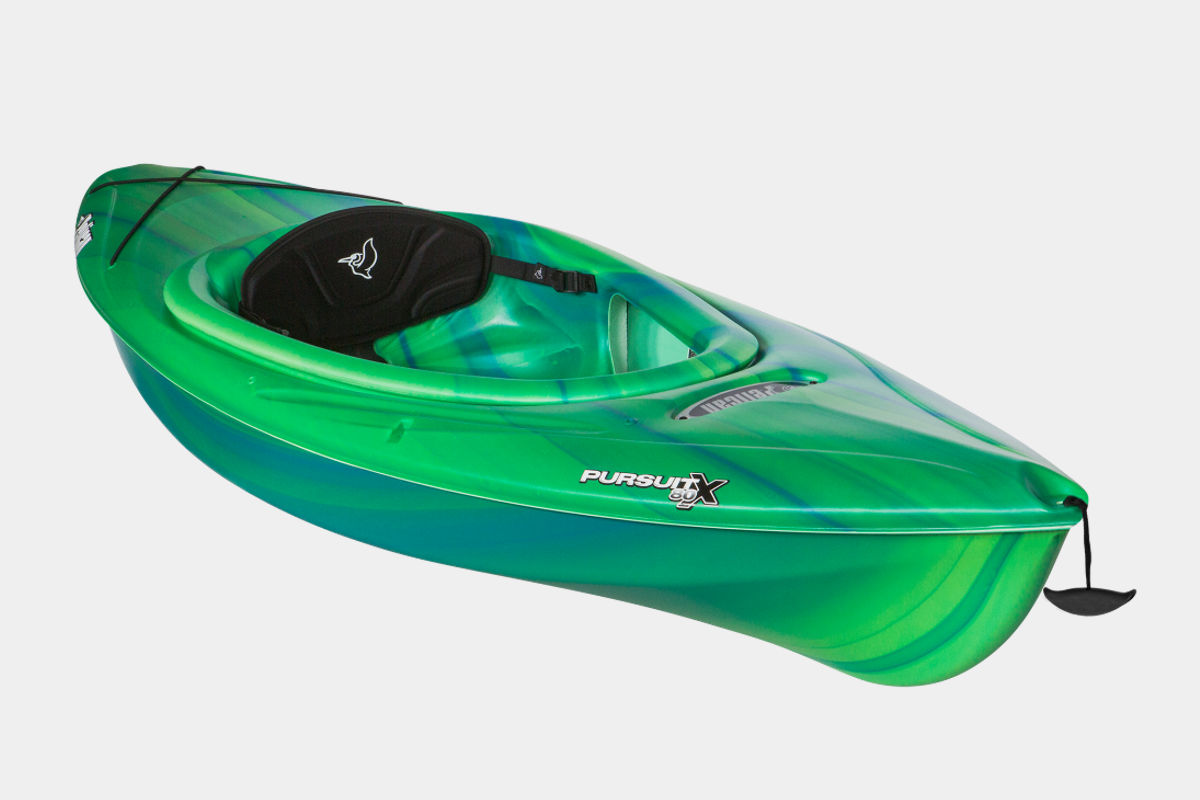 Pelican Pursuit 80X Kayak
Pelican Pursuit 80X Kayak
Light and fast, the Pelican Pursuit 80X sit-in kayak is very maneuverable and has superb tracking – which is what we have come to expect from Pelican. It turns quickly and can therefore resist the occasional type I or II rapid, and its puncture resistant hull will keep you dry throughout. It’s made from RAM-X Impact resistant polyethylene, with ERGFORM back rests.
Although very small, it is a great option as a second kayak as well, as it can easily fit inside an SUV. The only downside? A relatively limited weight capacity: the Pursuit requires either little gear or a light rider.
At 7 feet, 9 inches long and 28 inches wide, the Pelican Pursuit weighs barely 26 pounds. This is close to nothing, allowing it to be lifted with just one hand. It can only carry up to 200 pounds, though, so pack light.
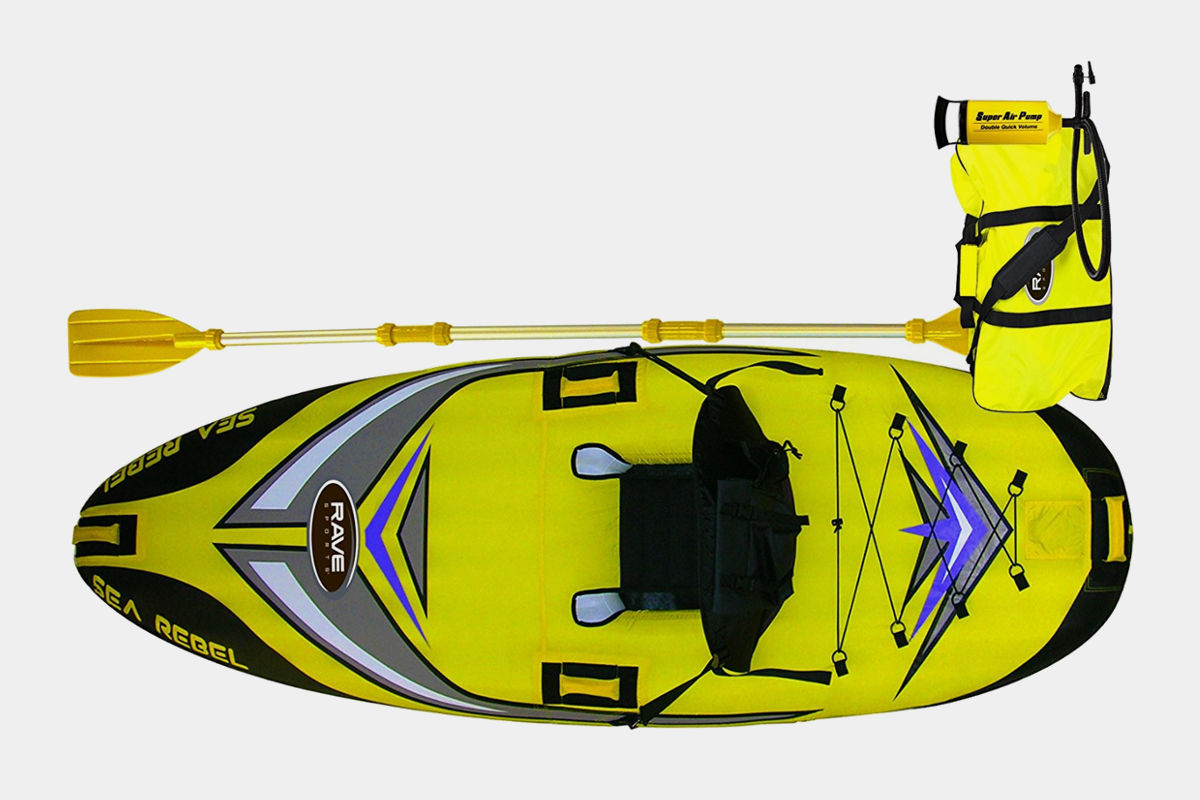 Rave Sports Rave Sea Rebel
Rave Sports Rave Sea Rebel
However the Rave Sports Sea Rebel sit-on-top inflatable kayak has managed to overturn these stereotypes at every step. Sleek and easy to assemble, this kayak steers well, making straight lines easy. It comes with 4 foam-filled handles and foldable aluminum paddles. The bottom is coated with tarpaulin, which protects it and makes gliding easier. The hull is 420 Denier nylon.
The Sea Rebel is 8 feet, 7 inches long and 35 inches wide. It weighs 22 pounds and is ideal for carrying up to 200 pounds.
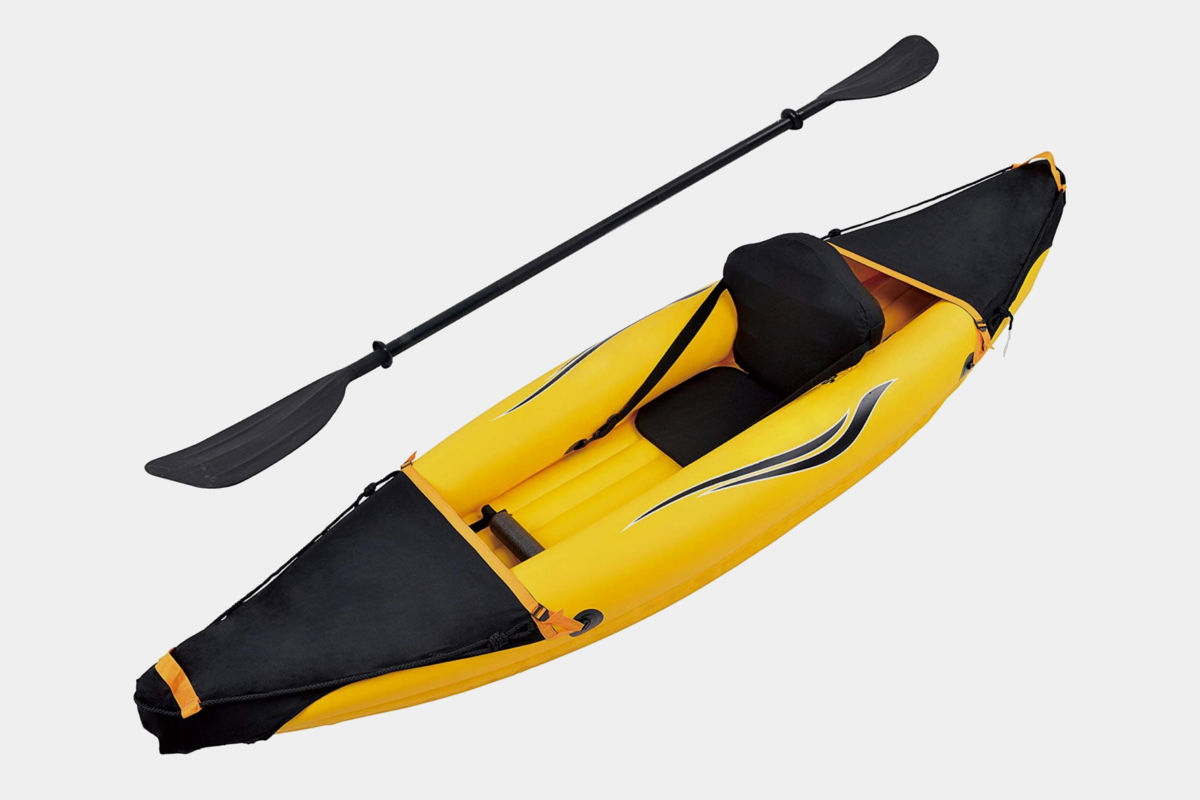 Blue Wave Sports Nomad
Blue Wave Sports Nomad
It is also equipped with adjustable and removable foot rests and seat covers, and the collapsible aluminum oars are light, yet made of high-quality resistant material (87-inch aluminum, one piece construction.) Add two directional bottom fins, and the result is a reliable and stable kayak that won’t bother you during the trek, but will resist calm and rough waters alike.
At only 9 feet long, 20 inches wide, and weighing 21 pounds, the Blue Wave Sports Nomad can nonetheless carry up to 220 pounds. It comes with a light but efficient foot pump for quick and easy and inflation.
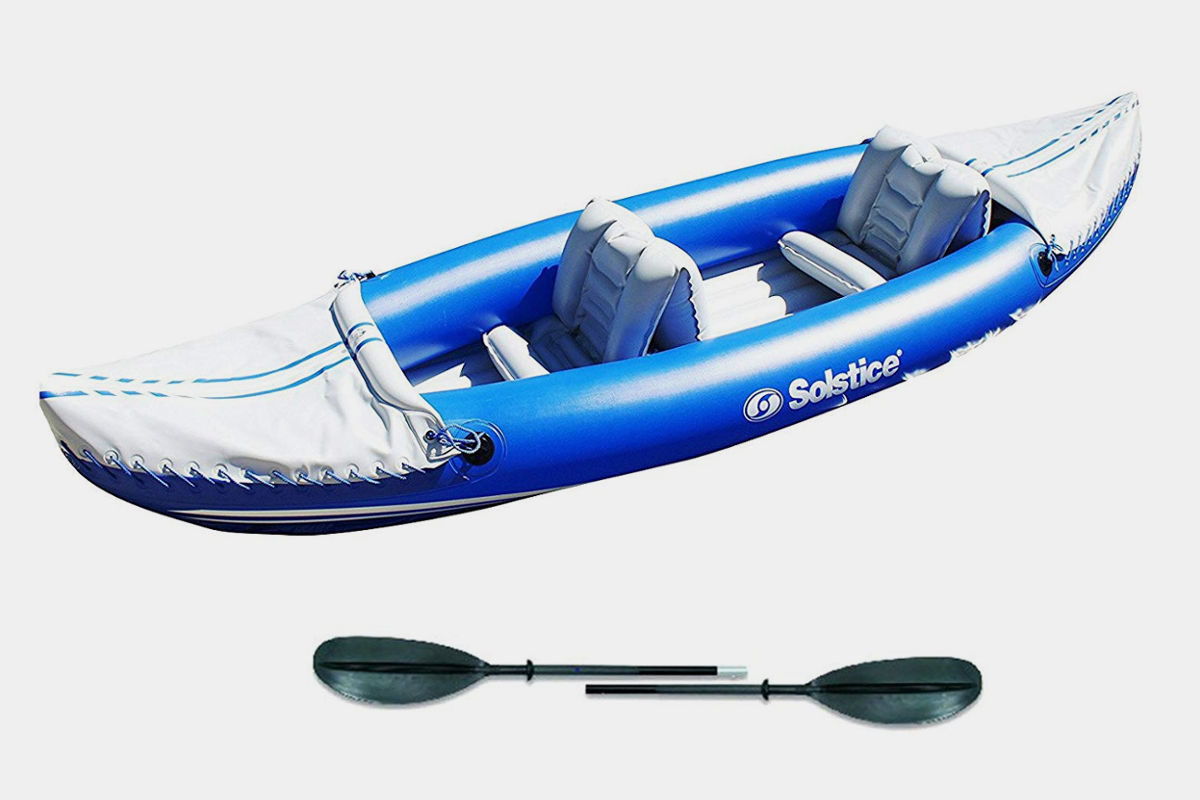 Swimline Solstice 29900 Whitewater Rapids Rogue
Swimline Solstice 29900 Whitewater Rapids Rogue
Some smart add-ons to the beam floor provided remarkable resistance and control to this kayak. It turns around quickly and can face a good rapid without breaking too much of a sweat. The seats are bulky but provide extra padding to keep your back at ease, and they’re fully removable as well, so if you would rather sail solo, you can adjust the seat configuration very easily. The oars are made of lightweight aluminum and can be split in two for easy transport.
At 10 feet long and 33 inches wide, the Swimline Solstice can carry up to 360 pounds. Its full weight is 65 pounds.
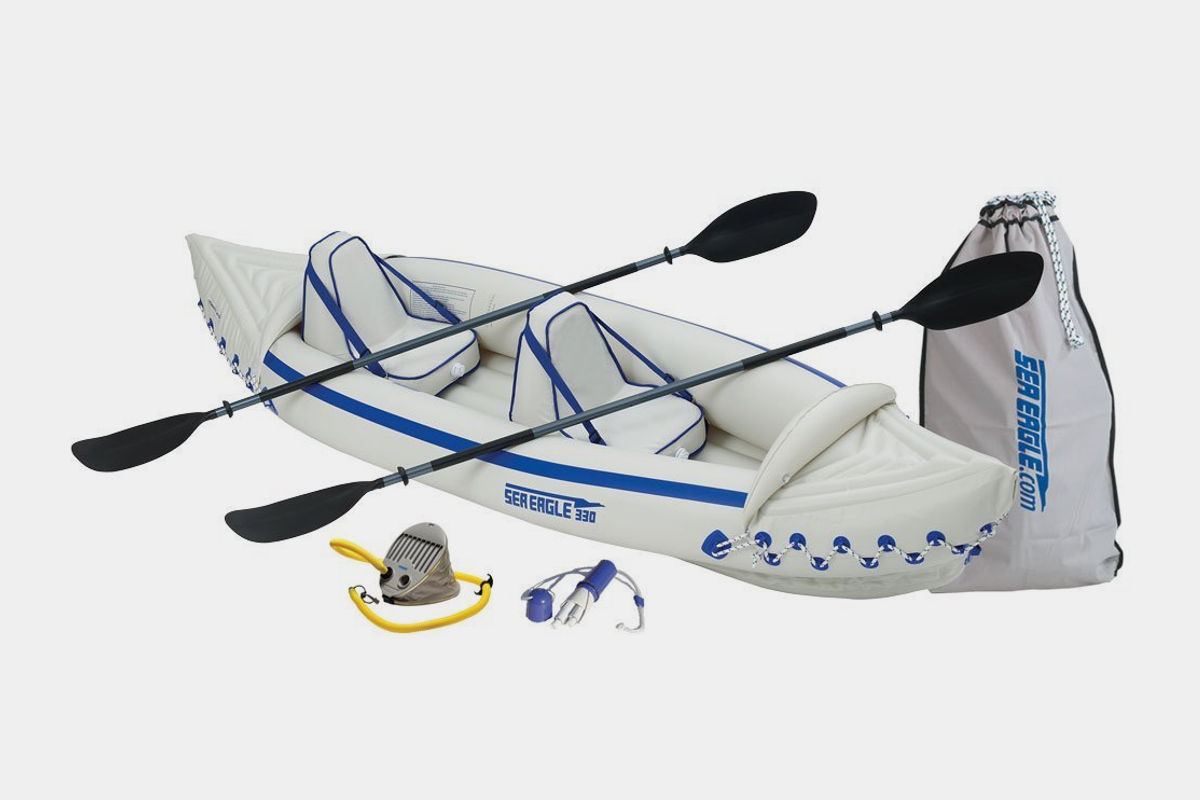 Sea Eagle SE330 Pro
Sea Eagle SE330 Pro
Added fins at the bottom for extra stability, smooth paddles, and efficiently foldable, the SE330 still manages to stat at an affordable price and to handle heavy loads of up to 500 pounds. The hull is also seawater and UV-resistant. It’s made from K-80 Polykrylar with I-Beam floor coating.
The round hull and hidden fins are a mainstay of this model, and those willing to forego the Deluxe package (which includes nicer oars and a foot pump) will find it makes an even cheaper choice that can fit into any newbie’s budget.
At 11 feet long and 34 inches wide, the Sea Eagle SE300 only weighs 26 pounds, which is astonishing for its 500-pound carrying capacity. Feel free to simply carry it on your next trek, just in case an irresistible lake pops up.
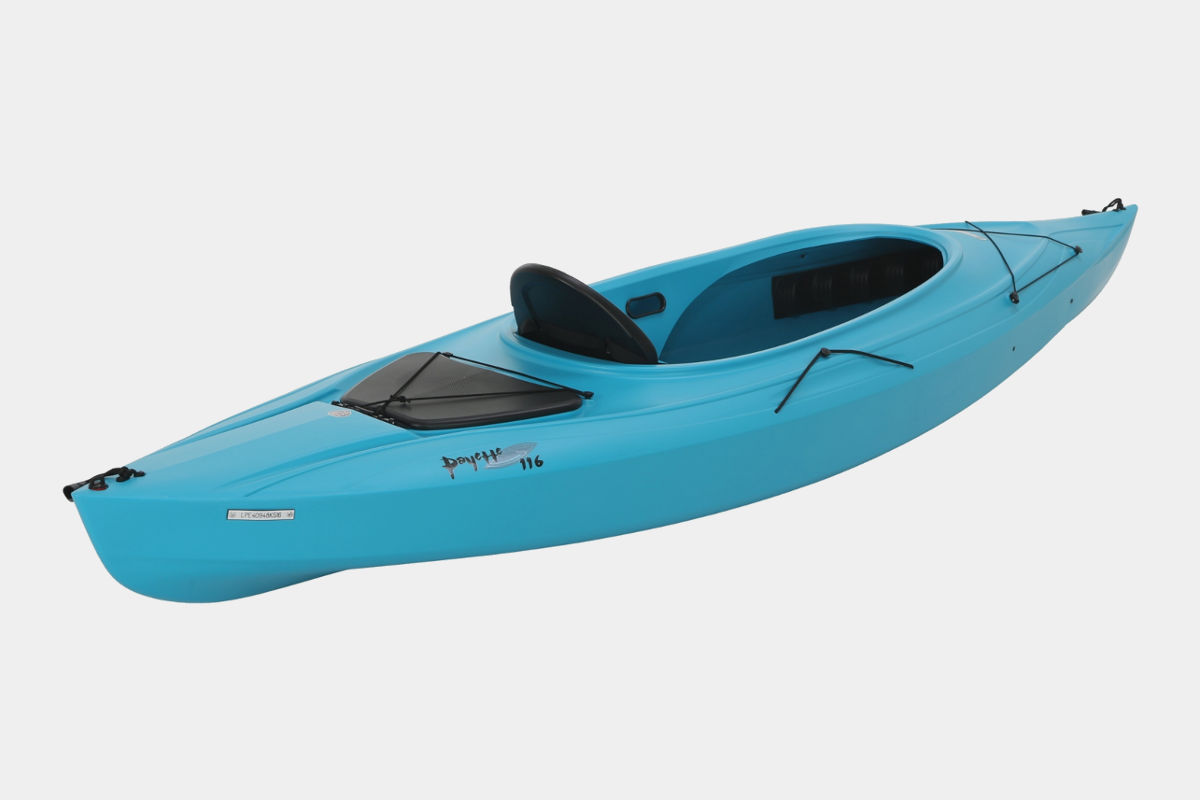 Lifetime Payette
Lifetime Payette
A flat bottom adds stability to the high density polyethylene hull. Sturdy handles make it easy to carry and its bungees add an extra place to store the gear you don’t mind wetting.
The Payette’s backrest is remarkable for its subtle padding and holding straps that make it easy to adjust and to keep your back in the right position for easy paddling. It also provides a good reference point for beginner kayakers who have a tendency to slouch. The adjustable foot rests and large cockpit make it friendly for larger sailors too. Although it has shock cord straps, it doesn’t come with oars or paddles.
Weighing in at 46 pounds, the Payette can carry up to 250 pounds. The full length measures 116 inches (or just over 9 feet) and it is 30-inches wide.
What Types of Kayaks Can You Find (Without Breaking Your Budget)?
Most budget-friendly kayaks available right now are inflatable, although they are not the only options. You may need to do away with some of the high-tech specs or pass on some of the available upgrades – but you can always get those later, right? After all, once you have yourself a good inflating vest and somewhere to carry your gear, then you just need the vessel and a good pair of paddles to be able to get started. Tandem kayaks are slightly harder to find at lower prices.
Most inflatable kayaks are sit-on-top models. These are usually the model of choice for beginners and for those who are fond of stopping mid-route for a quick dip in the water.
They are significantly easier to board on and off, and are usually equipped with drain plugs to get rid of any water that accidentally gets inside the boat without having to use a pump. They’re also a bit more comfortable for large sailors, and accessing your dry box tends to be easier than with sit-in models.
Sit-in kayaks, on the other hand, tend to be faster and more stable, so they are usually preferred for seawater kayakers or for people who like to face stronger currents. However, they can be a bit claustrophobic for some, especially kayakers with long legs.
Sit-in kayaks need a bit more practice getting used to, and many find themselves looking for an extra hand when boarding in. While pumping water out of a sit-in kayak can be a hassle, it is also significantly easier to keep water out completely than with sit-on-top models. Finally, they tend to offer extra protection from the elements, which makes them ideal for cold-weather trips.
